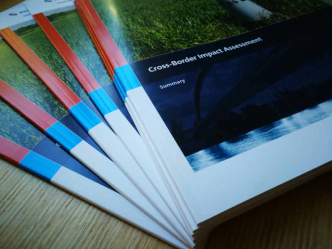Cross-border employment services: Effects of mandate and capacities of the Dutch UWV (employee insurance agency)
Cross-border employment mediation for job-seekers and cross-border services for employers are not discretionary options for national public employment services, but a required function. The new EURES[1] Regulation (EU) 2016/589 explicitly stipulates that employment services in border regions must work together more closely. [2] [2]
The compulsory function was created to ensure that all employees are able to enjoy the free movement of labour, on a fair basis and in accordance with Union law, national law, and all national practices, in the form of voluntary labour mobility. This is an engrained fundamental freedom, based on article 45 of the Treaty on the Functioning of the European Union (TFEU), from which common mechanisms have been established for the processing of job openings, applications, and CVs, and the exchange of information on the mobility of labour within the Union.[3]
Method
The research into the ‘Effects of mandate and capacities of the Dutch UWV’ within ITEM’s cross-border impact assessment 2016 revolves around the question of what effects the current mandate and capacities of the Dutch public service, the UWV[4], have on the performance of cross-border labour mediation along the border with Belgium and Germany.
The specific frontier region area used in this research is the border of the Netherlands province of Limburg with the German state of North Rhine-Westphalia, and the relevant labour market regions.[5] In this region, the UWV has collaborated with the German Bundesagentur für Arbeit in launching two projects designed to improve the cooperation considerably, in the spirit of the new EURES regulation.
The cross-border impact assessment within this research is, based on the determination of the geographic area, oriented primarily towards the theme of Euregional cohesion. Using a number of indicators, for this specific project a description is provided of the impediments that arise from the function and capacities of the UWV. The research is based on qualitative interviews with employees of employment agencies and EURES consultants, as well as intensive participatory observation during the development of the two cross-border partnerships. The availability of overall figures, for example, on the number of cross-border placements by UWV or EURES, is limited, but is also less relevant to the research. Moreover, any such figures would have to be comparable in frontier regions, something that is impossible with figures from Arbeitsagentur and VDAB, at least at present.[6] Even in a EURES context, the differences in the definitions and statistical methods are simply too great.
Indicators
An initial and very important indicator within the research was the question of whether the UWV had the personnel capacity for personal support of job-seekers over the border. Under its current framework, the UWV offers its job-seeker support primarily through online channels. Potential frontier workers are not seen as job-seekers requiring extra attention, despite the fact that staffers of the UWV as well as of the Arbeitsagentur both acknowledge that cross-border mediation demands more time for personal assistance.
It would be easy to conclude from the statements of staffers that cross-border services are difficult to integrate into the regular services.[7] Employees or supervisors of the UWV need to achieve targets, and these can be put at risk by devoting too much attention to cross-border mediation. Nonetheless, under the UWV’s current approach this task does need to be integrated into the standard service package.
Fortunately, regional efforts have paid off in bringing extra personnel to bear on the partnership projects and strengthening the UWV-Arbeitsagentur cooperation, particularly in North Limburg. It must be kept in mind, however, that this extra capacity is only temporary and not guaranteed for the long term. A focus on the part of local staff on ‘cross-border mediation’ has not yet been institutionalized. These are, strictly speaking, exceptions, because the example in South Limburg shows that it is extremely difficult to come up with extra manpower for the new cross-border service from within the UWV. The current capacity of the UWV seems to be a limiting factor in the conduct of cross-border labour mediation.
A second significant indicator within this study was the question of whether the UWV (in consideration of the limitations under the framework of the standard services) is utilizing the opportunities that EURES offers for cross-border labour mediation.[8] For the staffing of the new cross-border service in Kerkrade, which was founded in collaboration with the partners in South Limburg, the Arbeitsagentur was able to deploy its own EURES advisors because these people were already carrying out cross-border activities like the actual placement of Dutch job-seekers with German employers. This was something impossible for the UWV to do in the same way. One cause of this was the fact that EURES advisors in the Netherlands are much more strongly focused on information and communication, and not specifically on the placement of job-seekers. A second cause that can be identified is that the staffing capacities of EURES in the Netherlands are considerably more limited than the capacities of the Arbeitsagentur.
Additionally, advisers in the Netherlands have, up until now been performing not only cross-border activities, but particularly transnational activities.[9] This means that the way in which the UWV is using EURES, is in itself an impediment to a closer, more systemic partnership with the employment services along the border.
A third indicator researched was the question of how the UWV can process the data of foreign job-seekers and employers. Until the summer of 2016, there was no simple way for German and Belgian job-seekers to be registered in the UWV’s system; without a ‘DigiD’ (Dutch identity management platform registration) and Dutch postcode, registration proved problematic. Employers also had technical problems (relating to tax ID numbers and postcodes) up until the summer of 2016. By comparison, the systems of the Arbeitsagentur and VDAB seem to be more open for the purposes of cross-border data traffic. This would imply that the system does not facilitate systematic cross-border cooperation.
ITEM’s research also revealed that at present the UWV does not have the financial means to devote to extra training of job-seekers to prepare them for a job on the other side of the border (language courses, etc.). The ad hoc funding through extra provincial resources or with the help of a sector plan has so far not produced satisfactory results.
Conclusion
From the intensive support and analysis of the Limburg cross-border projects, ITEM was able to establish that the current standard approach in the capacities of the UWV are not promoting the objective of closer cross-border mediation of labour. More to the point, the regional services in Limburg have so far attempted to work around these institutional limitations with individual, ad hoc solutions.
_____________________________________________
[1] European Employment Services.
[2] See preamble, consideration 5, Regulation (EU) 2016/589 of the European Parliament and the Council of 13 April 2016 on a European network of employment services (EURES).
[3] Regulation (EU) no. 492/2011 of the European Parliament and the Council.
[4] UWV is the Uitvoeringsinstituut Werknemersverzekeringen, the employee insurance schemes implementing body. According to its own description, it facilitates expert and efficient implementation of employee insurances, and offers labour market and data services.
[5] These are the Dutch labour market regions North & Central Limburg and South Limburg, and, on the German side, the Arbeitsagenturbezirk for Aachen-Düren, Mönchengladbach, and Krefeld.
[6] Vlaamse Dienst voor Arbeidsbemiddeling en Beroepsopleiding (Flemish Service for Labour Mediation and Professional Education).
[7] Personal assistance plays a crucial role in the standard services of the Bundesagentur für Arbeit, and this is something that the Bundesagentur also offers to Dutch job-seekers.
[8] EURES is an element of the European EaSI programme for employment and social innovation. It is an EU financing tool intended to promote a number of goals, including quality, sustainable employment.
[9] After the summer of 2016, this changed; now, of the sixteen Dutch EURES advisors, six are fully focused on cross-border activities.


